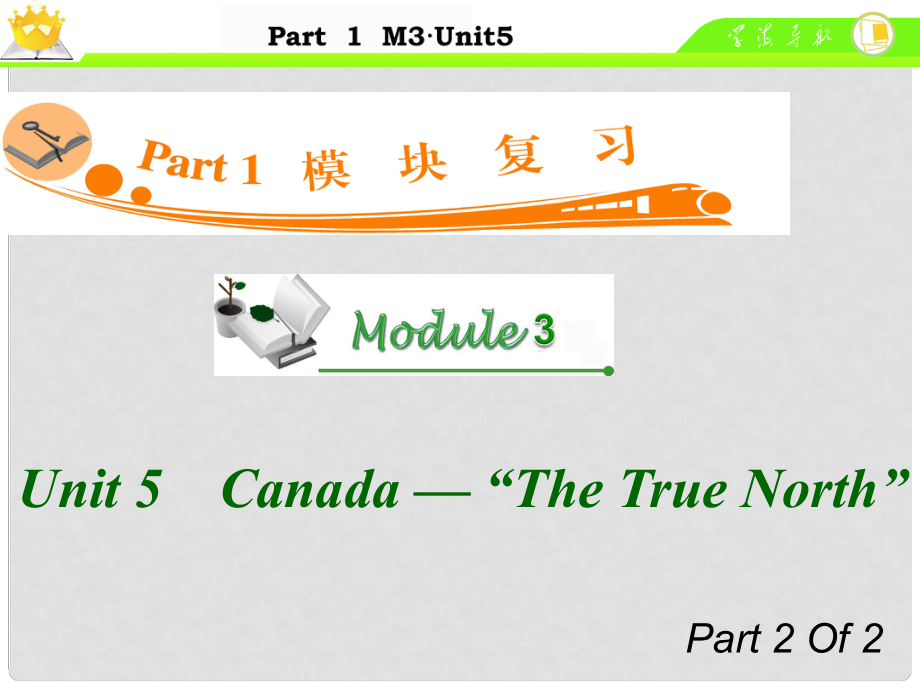《廣東省高中英語總復(fù)習 M3 Unit 52 Canada — “The True North”課件》由會員分享���,可在線閱讀,更多相關(guān)《廣東省高中英語總復(fù)習 M3 Unit 52 Canada — “The True North”課件(36頁珍藏版)》請在裝配圖網(wǎng)上搜索��。
1、Unit 5Canada “The True North”Part 2 Of 2 1 . compare A with B 把A與B作對比 The accidents caused by drunk driving have decreased by 7% compared with that of last year. 由于酒后駕車所造成的交通事故較去年下降7%���。 compare A to B 把A比喻成Bcompare with / to 與相比較根據(jù)漢語意思����,完成英文句子(1)人們把年輕人比作早晨的太陽��。 Young people _ the sun in the morning.(2)
2�����、和許多人比起來���,她確實是很幸運的����。 _�, she was indeed very fortunate.are compared toCompared with / to many people 2. rather than 而不是,與其說是不如說是(前后兩端所連的詞性是一致的) He would do farm work in the countryside rather than earn his living in big cities. 他寧愿在鄉(xiāng)下種地也不愿在大城市謀生��。would rather dothan dowould dorather than dowould prefer t
3����、o dorather than do寧愿做����,而不愿做or rather 更確切地說根據(jù)漢語意思�����,完成英文句子(1)我寧愿在7月去��,不愿在8月去��。 Id prefer to go in July_in August.(2)這么美好的一周��,你打算做什么呢�����? What do you _ in this beautiful week?rather thanprefer to do(3)她寧可收入少而做她喜歡的事情�,不愿為了賺大錢而做與興趣不合的事。 She _ a little and do what she likes, than acquire a great deal by working ag
4��、ainst her interest.(4)我寧愿你明晚不去參加湯姆的晚會�����。 I would rather that you _ (not go) to Toms party tomorrow evening.would rather havedidnt go 3. settle down 安居;使安靜��,使鎮(zhèn)靜Having drifted through several cities, he has finally settled down.他曾經(jīng)在幾個城市流蕩��,現(xiàn)在終于安頓下來了��。 settle on / upon 同意��,決定settle in 遷入settle to do sth. 決定做
5�����、某事根據(jù)漢語意思�,完成英文句子(1)他終于安下心來學習了����。 He finally _ to his study.(2)我們住進了新房。 We _ our new home.settled downare settled in (3)孩子們��,不要鬧了���,靜下來做你們的功課����。 Stop playing about, children, and_your homework. (4)他們還決定不了到哪兒去度假。 They _ where to spend the holiday.settle down to docould not settle on 4. in the distance 在遠處����,在遠方
6、 Looking from the top of a hill, you can see longstretched rivers in the distance. 站在山頂可以看到遠處細細長長的河流��。 at a distance 距離稍遠一些from a distance 從遠方Keep a distance! 別靠近����!keep sb. at a distance 與某人保持一定距離be distant towards sb. 對某人冷淡a distant relative 遠親根據(jù)漢語意思,完成英文句子(1)我看見公共汽車從遠處開來了��。 I could see the bus coming
7��、_. (2)這幅畫隔遠一點看好看一些�����。 The picture looks better_.in the distanceat a distance (3)鴿子從100英里之外返回鳥巢��。 The pigeon are flying home_100 miles. (4)史密斯先生對店里的員工很和善�����,但下班后便與他們保持距離��。 Mr. Smith is kind to the workers in his store, but after work he keeps them_.from a distance ofat a distance 1. “比較級比較級than any other 單數(shù)
8、名詞單數(shù)名詞”表最高表最高級級 英語中常用“比較級than any other 單數(shù)名詞”或“比較級than any of the other 復(fù)數(shù)名詞”的句型來表示最高級��。其中的other是用來表示同一比較范圍內(nèi)除主語以外其他的人或事物���,不可省略。如果主語不在同一范圍內(nèi)�����,可用“比較級than any單數(shù)名詞”的句型�����。 China has a larger population than any other country in the world. 中國是世界上人口最多的國家�����。根據(jù)漢語意思���,完成英文句子上海比中國其他的城市大�。 Shanghai is larger than any_. ot
9�、her city in China of the other cities in China 2. with介賓短語作定語,介賓短語作定語��,“具有,帶有�����;加上�����;具有��,帶有��;加上��;包括包括在內(nèi)在內(nèi)” with 還可表示原因或伴隨�����,意為“因為���,由于���;隨著”等。它和它的反義詞without都能接復(fù)合賓語�,即在其賓語后加上作賓語補足語的形容詞�、副詞或非謂語動詞等�。with的用法:withn.adj. withn.介詞短語withn.doingwithn.donewithn.to doChina is a country with splendid culture.中國是一個擁有著燦爛文化的國度。用所給
10����、詞的正確形式填空(1)他喜歡關(guān)著窗子睡覺。 He likes to sleep with windows _ (close)(2)在那位老人的帶領(lǐng)下��,我們走出了森林����。 With the old man _ (lead) the way, we got out of the forest.closedleading(3)因為還有很多事情要做��,那個可憐的男孩匆匆離開�����。 With a lot of things _ (do), the poor boy left in a hurry.(4)可惜的是���,這位偉大的作家還未完成他的作品就去世了��。 It is a pity that the great w
11���、riter died with his work _ (finish)to dounfinished 如何使用高級詞匯及如何使句式多樣化如何使用高級詞匯及如何使句式多樣化 高考英語寫作部分在語言方面的要求中有:能盡量使用較高級詞匯�����。英文寫作中若有高級詞匯����,是獲取高分的重要條件之一�����,但如何使用高級詞匯�����? 1注意使用詞組���、習語來代替一些單詞以增加文采�����。如:用catch sight of代替see�����,用care nothing for代替dislike等�。 2使用一些很有“洋味”的單詞。 Thank you for sharing the time with us. (用share而不用spend)
12���、The noise nearly drove me mad. (用drive而不用 make) Tom had his leg broken last week. (用have his leg broken而不用break his leg) 3避免重復(fù)使用同一單詞或短語�。如:用We have built a new classroom building besides the oldone and we have also set up a library where the old one used to be. 比用We have built a new classroom buildin
13�����、g besides the old one and we have also built a library where the old one used to be. 好���。 英文寫作中��,不同的思想內(nèi)容要用不同的句式來表達�����;而同一思想內(nèi)容也可以用不同的句式來表達。句式不同�,表達效果也就不同。只有句式多樣化��,文章才會生動有趣�����,充滿活力。 可是���,在實際寫作中�,初學寫作的學生往往一篇文章都是千篇一律的簡單句�����,文章單調(diào)乏味��,毫無生氣���。筆者認為�,恰當?shù)厥褂媚承┓椒ɑ蚴侄斡兄趯嶋H表達形式的多樣化�,增強表達效果。下面將常用方法簡單介紹如下: 1改變句子的開頭方式��。不要一味地都是主語開頭�����, 可以把狀語置于句
14�、首等。如: (原) He was still absorbed in his work deep into the night. (改) Deep into the night, he was absorbed in his work. 2學會運用特殊句式��。 省略句: If necessary, we shall send a telegram home. 倒裝句: Not only did he refuse the gift, he also severely criticized the sender. 強調(diào)句: It was at that moment that he changed
15、 his mind. 3學會使用復(fù)合句���、分詞狀語����、感嘆句�����、with的復(fù)合結(jié)構(gòu)�����、獨立主格���、it句型等多種句式����。如: (原)Yesterday my father went to Tianhe Mall. He bought us a lot of gifts. (改)Yesterday my father went to Tianhe Mall where he bought us a lot of gifts. (原)There was nothing else to do. We went home. (改)There being nothing else to do, we went ho
16���、me. 英語的句式是多種多樣的,只要從要表達的內(nèi)容出發(fā)合理選用�����,文章的句式就會富于變化。在學習寫作的過程中���,學生應(yīng)不斷練習構(gòu)造各種各樣的句式����,以提高語言表達能力��。按要求改寫下列句子1. The singer came out of the airport. A lot of fans followed him. He had a bunch of flowers in his hand. (1)簡單句:_(2)并列句:_ Followed by a lot of fans, the singer came out of the airport, with a bunch of flowers
17����、in his hand. The singer came out of the airport, with a bunch of flowers in his hand, and a lot of fans followed him. (3)復(fù)合句:_ The singer who was followed by a lot of fans came out of the airport, with a bunch of flowers in his hand. 2.My uncle lives in a small town. In the town there is a big facto
18、ry. He has worked there for sixteen years. (1)用it改寫上組句子:_ (2)用復(fù)合句和并列句改寫:_ My uncle lives in a small town. In it there is a big factory. He has worked there for sixteen years. In the small town where my uncle lives, there is a big factory, and he has worked there for sixteen years.(3)用復(fù)合句和簡單句改寫:_(4)用復(fù)合句改寫:_ My uncle lives in a small town, where there is a big factory. He has worked there for sixteen years. My uncle has worked for sixteen years in a big factory in the small town where he lives.
 廣東省高中英語總復(fù)習 M3 Unit 52 Canada — “The True North”課件
廣東省高中英語總復(fù)習 M3 Unit 52 Canada — “The True North”課件

